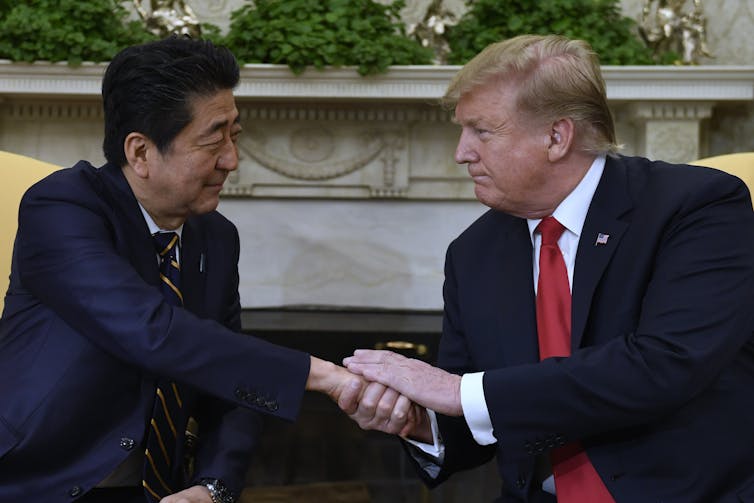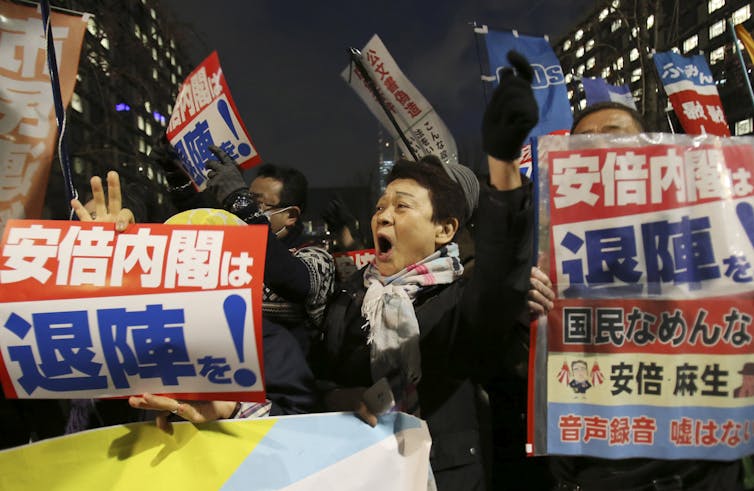Trump for the Nobel Peace Prize? Japan's nomination is part of a strategic plan
- Written by Chris G. Pope, Researcher, Kyoto Women's University
Japan wants talks with North Korea, and its prime minister thinks Donald Trump can help.
On May 3, North Korea, a nuclear power, launched short-range missiles[1] off its east coast, uncomfortably close to neighboring Japan. It is not the first time[2] North Korea has shot ballistic missiles over, near or into Japanese territory in recent years.
After the most recent test, Prime Minister Shinzo Abe called U.S. President Donald Trump – whom he had recently visited in Washington for trade talks[3] – to discuss his intent to meet with North Korean leader Kim Jong Un for “unconditional” denuclearization talks.
Abe’s call to Trump comes several months after Abe apparently nominated Trump for a Nobel Peace Prize in February for his efforts to forge a dialogue with North Korean leader Kim Jong Un[4]. The recommendation was unexpected, given Trump’s aggressive “America first” foreign policy and disdain for multilateral international cooperation. After U.S. talks with North Korea collapsed shortly thereafter[5], a Nobel nod seemed wholly unwarranted.
While Prime Minister Abe has refused to clarify[6] his reasoning for the nomination, a February 17 article[7] in Japan’s Asahi newspaper reported that the U.S. asked Japan to put Trump’s name forward. Trump has confirmed[8] that Abe nominated him in a “beautiful” five-page letter.
Other world leaders might have turned down that request. But Abe needs U.S. support to achieve many economic, political and foreign policy goals. From my perspective as a Kyoto-based scholar of Japanese politics[9], nominating Trump for a Nobel Peace Prize is, for Abe, more sensible than it might seem.
Japan and North Korea
Trump’s unexpected decision last year to engage in discussions with Kim aligns much more closely with the diplomatic goals of China[10] and South Korea – which say their goal is maintaining stability in the Asia region – than with Japan, which has taken a hardline stance against the North Korean regime.
Well before taking office as prime minister in 2012, Abe has demanded nothing less from North Korea than “denuclearization for peace[11].”
That was the U.S. position before Trump’s recent rapprochment[12], too. So Trump’s diplomatic approach to North Korea has basically left Japan out in the cold.
Beyond wanting to protect Japan from North Korean military aggression, Abe has another big demand for the Kim regime. He hopes to force North Korea to return the remaining 12 Japanese citizens believed to have been abducted by North Korea[13] between 1977 and 1983.
In 2002, North Korea officially admitted to abducting 13 Japanese citizens and, in an effort to restore good faith with Japan, agreed to return five of them temporarily – provided they were forced to return to North Korea.
Japan agreed.
However, Abe, who was then deputy prime minister, ensured that the detained Japanese citizens never went back[14], breaking his government’s agreement with North Korea. Ever since, North Korea has either denied that it still is detaining the remaining Japanese prisoners or claims that those in North Korea have since died.
Abe assumes they are alive and is eager to get them back – and show to his electorate he has the clout to do so.
This is where Trump comes in.
Trump’s dialogue with Kim Jong Un, which may be restored in a third U.S.-North Korea summit[15], could give Japan the opportunity to push its case. To get Trump to put it high up on the negotiating agenda, Abe needs to be on the U.S. president’s good side.
 Abe and Trump met at the White House for trade talks on April 26, 2019.
AP Photo/Susan Walsh[16]
Abe and Trump met at the White House for trade talks on April 26, 2019.
AP Photo/Susan Walsh[16]
‘Abenomics’ and Japan’s waning global role
A good working relationship with the United States is essential for Abe to realize his other ambitions, too.
Japan, once the world’s second-largest economy, has an aging population and entrenched deflation. Abe has a domestic economic strategy – dubbed “Abenomics[17]” – to spur revitalization, but the United States, as Japan’s largest trade surplus partner, is critical to keeping the Japanese economy afloat.
Trump has made numerous statements regarding “unfair Japanese trade practices[18]” that endanger this trade relationship. His administration already levied tariffs on Japanese steel and aluminum and has threatened to tax Japanese automobiles[19], too.
For Abe to succeed in office, economic growth is key[20]. Public approval for his government is flagging[21], having fallen to 39% in March.
So Abe desperately needs to stay in the good graces of the United States, which means, right now, getting on the good side of Donald Trump.
 Anti-Abe protesters in Tokyo hold signs calling for Abe’s resignation after his administration was ensnared in a corruption scandal, March 23, 2018.
AP Photo/Koji Sasahara[22]
Anti-Abe protesters in Tokyo hold signs calling for Abe’s resignation after his administration was ensnared in a corruption scandal, March 23, 2018.
AP Photo/Koji Sasahara[22]
Alignment with the U.S. may also help Abe convince voters to approve a controversial change to Japan’s post-World War II Constitution[23] his administration has pushed since 2012.
Abe wants to amend the Japanese Constitution, which was drafted by the United States to prohibit the defeated country from having a standing army, to strengthen Japan’s domestic security forces. Trump has encouraged Japan to remilitarize[24], citing its need to protect itself from North Korea[25].
But critics in Japan say the new draft Constitution[26] gives far too much power to the prime minister’s office, and public support for amending the Constitution appears low[27].
Abe’s effort to expand Japan’s military role may have something to do with North Korea. But the prime minister also wants to raise Japan’s profile as a global power.
He has, for example, argued vehemently[28] for it to become a permanent member of the United Nations Security Council – a move that would put Japan on equal footing with its powerhouse neighbor, China.
Recognizing how many of his political goals depend on an unpredictable U.S. president, Abe has worked hard to foster amicable relations with Trump[29]. He has played frequent rounds of golf with the U.S. leader[30], invited him to meet the country’s new emperor[31] – and, yes, even nominated him for a Nobel Peace Prize.
References
- ^ launched short-range missiles (www.nytimes.com)
- ^ not the first time (www.bbc.com)
- ^ visited in Washington for trade talks (fortune.com)
- ^ his efforts to forge a dialogue with North Korean leader Kim Jong Un (www.reuters.com)
- ^ collapsed shortly thereafter (www.nytimes.com)
- ^ refused to clarify (www.chicagotribune.com)
- ^ February 17 article (www.asahi.com)
- ^ confirmed (www.cnn.com)
- ^ Kyoto-based scholar of Japanese politics (www.researchgate.net)
- ^ China (www.cfr.org)
- ^ denuclearization for peace (chasfreeman.net)
- ^ U.S. position before Trump’s recent rapprochment (www.chinadaily.com.cn)
- ^ abducted by North Korea (etheses.whiterose.ac.uk)
- ^ never went back (www.nikkan-gendai.com)
- ^ third U.S.-North Korea summit (www.politico.com)
- ^ AP Photo/Susan Walsh (www.apimages.com)
- ^ Abenomics (www.bloomberg.com)
- ^ unfair Japanese trade practices (www.ft.com)
- ^ threatened to tax Japanese automobiles (www.nytimes.com)
- ^ economic growth is key (survey.gov-online.go.jp)
- ^ flagging (www.japantimes.co.jp)
- ^ AP Photo/Koji Sasahara (www.apimages.com)
- ^ change to Japan’s post-World War II Constitution (www.japantimes.co.jp)
- ^ remilitarize (time.com)
- ^ protect itself from North Korea (www.nytimes.com)
- ^ draft Constitution (constitution.jimin.jp)
- ^ appears low (www.washingtonpost.com)
- ^ argued vehemently (edition.cnn.com)
- ^ foster amicable relations with Trump (www.politico.com)
- ^ rounds of golf with the U.S. leader (www.bloomberg.com)
- ^ new emperor (theconversation.com)
Authors: Chris G. Pope, Researcher, Kyoto Women's University

